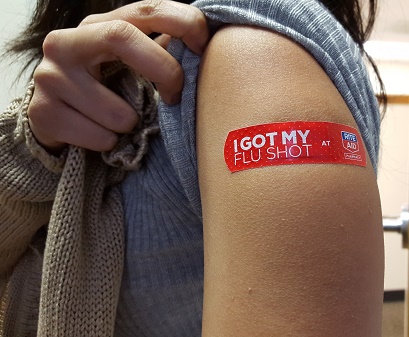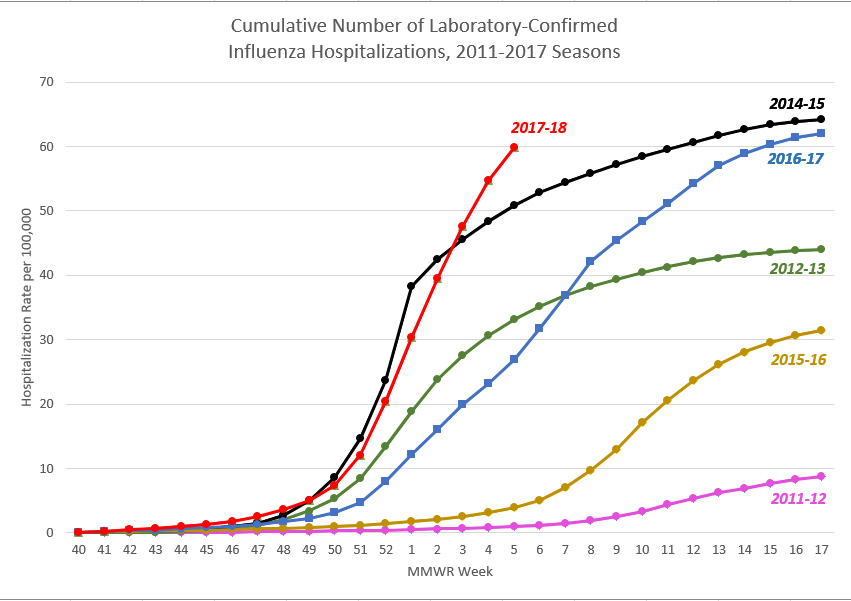Influenza—also known as the flu—is one of the most common and deadly viruses that spreads throughout the US every year. With the peak of the flu season beginning in January and continuing through March, now is the time to get your flu vaccine if you haven't done so already.
Experts recommend that every person over 6 months old get the flu shot every year, but it is especially important for older adults and people with serious health conditions. This applies particularly to people with chronic respiratory diseases like COPD, who have a much higher risk of experiencing life-threatening complications if they get exposed to the flu.
Unfortunately, most adults fail to get the vaccine, and only about forty percent of American adults get their flu shot in any given year. However, doctors and health experts strongly urge all adults to get vaccine, both for their own health and to protect the health of others.
Still, flu vaccination rates stay low, in part because many people underestimate how serious and deadly the flu can be. This, in turn, causes many people to underestimate the importance of the flu vaccine and assume that skipping the yearly shot is not a big deal.
In this post, we're going to explain why getting your flu shot is vital, whether you are old, young, healthy, sick, or anything in-between. We'll also take a closer look at some of the reasons people decline the flu shot while debunking some of the most common myths and misconceptions.
We'll show you how the flu shot works, why it's recommended, and how it protects the lives of people with COPD and other chronic diseases. With the information in this guide, we hope that you will better understand the flu vaccine and why doctors believe it is so important for public health.
Flu Vaccine Basics: What You Should Know
Who Should Get the Flu Vaccine?

Many people assume that the flu vaccine is meant mainly to protect the young, elderly, and people with serious health conditions. However, this is false; doctors and health experts urge everyone over 6 months of age to get a flu shot every year, with just a few exceptions.
Your doctor will be able to tell you if you should get the flu vaccine and will give you the vaccine that is appropriate for your age. For example, adults over the age of 65 receive a special high-dose flu vaccine that is more effective for older adults.
According to the CDC, the following people should get vaccinated against the flu every year:
- Children 6 months of age and older
- All adults, including pregnant women
- Most adults who have chronic health conditions (talk to your doctor if you are unsure)
However, there are some people who should not get the flu vaccine, including:
- Some people with allergies to eggs or other ingredients in the vaccine (If you are allergic to eggs, you should notify your doctor, but you can most likely still get a flu vaccine.)
- Some people with Gillain-Barre Syndrome
Who Recommends the Flu Vaccine?

Just about every major governmental health organization along with many other expert health organizations recommend routine flu vaccination. They emphasize the importance of vaccination in the young, elderly, and those with chronic health conditions, but also urge healthy children and adults to get the vaccine as well.
Here is a list of some of the major health organizations that endorse the flu vaccine:
- The United States Center for Disease Control and Prevention (CDC)
- The World Health Organization (WHO)
- Canada's National Advisory Committee on Immunizations (NACI)
- The European Center for Disease Prevention and Control
- A large number of leading public health organizations and experts. The following represent just a few:
- American Academy of Family Physicians (AAFP)
- American Academy of Pediatrics (AAP)
- American College of Physicians (ACP)
- American Pharmacists Association (APhA)
- Association of Occupational Health Professionals in Healthcare (AOHP)
- National Foundation for Infectious Diseases (NFID)
- And many more!
Who is Most Vulnerable to Serious Flu Complications?

Certain groups of people are much more susceptible to the flu and flu-related health complications than others. This includes a larger number of people than most tend to realize, including anyone over the age of 65, anyone under the age of 5, and people with common health conditions like heart disease and COPD.
For these people, a flu infection could be deadly or cause serious secondary infections like pneumonia. That's why it's especially important for people who belong to these vulnerable groups to get vaccinated against the flu.
According to the CDC, it is particularly important for people in the following vulnerable groups to get the flu vaccine:
- Children under 5 years old (particularly children under 2)
- Older adults over the age of 65
- Pregnant women
- People in nursing homes and long-term care facilities
- Native Americans and Alaska Natives
- People with chronic respiratory illnesses, including asthma, COPD, and cystic fibrosis
- People with other chronic diseases, including heart disease, kidney disease, liver disease, and metabolic disorders like diabetes
- People with blood disorders (e.g. sickle cell disease)
- People with extreme obesity
- People with neurological and developmental disorders (e.g. cerebral palsy, epilepsy, stroke, and muscular dystrophy)
- People with suppressed immune systems (e.g. people taking steroids, immunosuppresant medications, and people with HIV)
- People receiving long-term aspirin therapy
When Should You Get Your Flu Shot?

The CDC recommends that you get your flu vaccine by the end of October every year. This gives the flu vaccine time to work before flu season begins to pick up in November-December.
In general, you will be protected from getting the flu about two weeks after you get your shot. That's why it's better to get your shot earlier in the season, rather than waiting until the flu has already begun to spread.
However, if you forget to get vaccinated early, you can still get the flu vaccine anytime throughout the winter and early spring. It will still be just as effective later in the season, but it won't be able to protect you from any flu viruses you catch before the vaccine takes effect.
If you are over the age of 65 or suffer from a chronic disease like COPD, then it's especially important for you to be protected from the flu for the entirety of the flu season. You should get your vaccine as early as possible so that your immune system has plenty of time to prepare before the virus begins to spread.
How Much Does the Flu Shot Cost?
If you have health insurance, then it's almost always free to get your yearly flu shot. But even if you don't have insurance, you may still be able to get the shot for free, or at least at a reduced price.
The chances are good that you can find some sort of program or event in your city that offers the flu vaccine for free. At worst, you shouldn't have to pay more than $25-35 out of pocket to get the shot at your local Walmart or CVS.
All Medicare plans also fully cover the flu shot. If you have medicare part B, the deductible doesn't apply to the flu vaccine, so you shouldn't have to pay any out-of-pocket costs.
If you don't have health insurance, click here to see a helpful list of some of the cheapest places you can go to get your flu vaccine.
Where Can You Get Your Flu Shot?

Flu shots are cheap, quick, and readily available all across the United States. You can get the vaccine at a variety of different places, including your doctor and just about any chain-business pharmacy.
Many colleges, employers, and other organizations also give flu shots on-site or offer vouchers to get a flu shot for free. You can also check with local health organizations and city, county, or state health departments to see if they offer flu vaccination programs or incentives.
Here is a list of some of the places you can go to get your flu vaccine:
- Your primary care doctor (you can make a special appointment or get the shot during a routine examination)
- Urgent care centers (these are often more convenient and closer to home than the doctor's office)
- Pharmacies (these are often the cheapest and most convenient option, and it's usually free if you have health insurance)
- Walmart
- Walgreens
- CVS
- Kroger
- Rite Aid
- Target
- Kmart
- Stop & Shop
Why You Should Get the Flu Vaccine: A Matter of Life and Death

The reason you should get your flu shot is twofold: first of all, you want to protect yourself from getting sick with the influenza virus and experiencing potentially life-threatening complications. The second is to prevent you from transmitting the virus to other people around you who could be even more vulnerable to the illness.
Here is a quick summary of the major benefits of getting the flu vaccine before we go into them in more detail.
Benefits of Flu Vaccination:
- Reduces your chances of getting sick with the flu
- Reduces your chances of experiencing a serious health complication (including hospitalization and death) from the flu
- Can reduce the severity of your flu symptoms and your risk of complications even if you end up getting sick with the flu
- Reduces your chances of spreading the flu virus to other people (including infants, who cannot receive the vaccine)
- Reduces the risk of serious complications, hospitalization, and death if you are over 65 or suffer from a serious health condition like COPD
- Protects pregnant women and infants (If a pregnant woman receives the flu vaccine during pregnancy, it can protect their infant child from the flu for several months after giving birth)
Getting the Flu Vaccine Protects Your Own Health

According to the Centers for Disease Control and Prevention (CDC), the flu kills, on average, 12,000 to 56,000 people in the US and puts up to 710,000 people in the hospital every year. The exact number of deaths and hospitalizations can vary significantly from year to year depending on the severity of flu outbreaks.
2017, for instance, was a particularly bad year for the flu in the US. That year, more than 80,000 Americans died from the flu, marking the highest number of flu-related deaths in four decades.
Many of these deaths and hospitalizations could have been prevented if more people had gotten the flu vaccine. Many of those who died were also healthy adults with no other serious medical conditions.
 |
| Image created by the CDC |
Just because you've had the flu before and it turned out fine, that doesn't mean you're not at risk in the future. You may have gotten over many flus in your life, but all it takes is one serious infection to put your life and health on the line.
Whether you are 17 or 75, the flu vaccine could save your life and significantly reduce your chances of being hospitalized with the flu. Especially if you have COPD or belong to another high-risk group, there is no reason to take the risk of not getting the shot when the vaccine is so cheap and readily available.
Getting the Flu Vaccine Protects Others Around You and Can Even Save Lives
Even if you are not concerned about getting sick yourself, failing to get your flu vaccine could put the lives of vulnerable people at risk. That's why doctors recommend that everyone, even those with a low risk of flu complications, get the flu vaccine every year.
Chances are, you, a family member, or someone else you know comes into regular contact with someone with a serious health condition who needs extra protection from the flu. More than 11 million people in the US have been diagnosed with COPD alone, and they are certainly not the only ones who are at risk.
Unfortunately, many vaccinations—including the flu vaccine—are not as effective in the elderly and people with compromised immune systems. Even if they get vaccinated, their immune systems may not be able to build up an effective immunity to the virus.
The same applies to infants under the age of 6 months, whose immune systems aren't fully developed. Because of this, infants this young can't generate the immune response necessary to gain immunity from the vaccine.
All of these people who cannot build immunity on their own--from infants to older adults to immuno-compromised individuals--have to rely on the people around them to get vaccinated to protect them from the flu. This relates to a concept known as herd immunity, which we'll discuss more in the sections below.
How Does the Flu Vaccine Work?
Even though the flu vaccine is more effective and more readily available than ever, a large percentage of people in the US still decline this life-saving vaccine. We hope that by learning more about how the vaccine works and the benefits it has to offer, more people—especially at-risk populations like people with COPD—will choose to get their flu vaccine every year.
How Does the Flu Vaccine Protect You From the Flu?

The flu vaccine is essentially a mixture of inactivated flu virus strains. However, instead of getting you sick, the viruses in the vaccine help your immune system prepare to fight similar viruses in the future.
Most simply put, the flu vaccine introduces your immune system to a small sample of the same types of viruses that it might encounter if you get exposed to the flu. Your immune system then “remembers” what those viruses look like by creating an army of tiny molecules—called antibodies—that can recognize what the virus looks like.
That's why, when you get the flu vaccine, it takes a couple of weeks to take full effect. During those two weeks, your immune system is working hard to build up store of antibodies that will lie in wait until you get exposed to the virus again.
The next time one of those viruses (or a similar virus) enters your body, the antibodies will recognize the virus immediately and mark it for destruction. This allows your body to kill the virus so quickly that it never gets the chance to infect you and make you sick.
How Do Researchers Develop the Flu Vaccine Every Year?

The first vaccine able to combat the influenza virus was developed by researchers in the mid 1940's. This first vaccine only worked against one specific strain of the flu virus, but modern flu vaccines offer even greater protection.
The flu vaccine is unique in the sense that it get re-formulated every year. This allows researchers to create a vaccine that targets specific virus strains that are active at the time.
This is necessary because the flu is not just a single virus. There are hundreds of different known flu virus strains, and they evolve and change very quickly.
Right now, it is impossible to develop a vaccine that works against every single flu virus strain. Even if it were, the flu virus changes so quickly that it would evolve to evade the vaccine over time.
That's why researchers work hard every year to predict which strains are the biggest threat. Then, they pick the top 3-4 strains and develop a vaccine that boosts your immunity to those and similar virus strains.

Researchers are pretty good at predicting which strains will be most active, even though their estimations are not always perfect. But even with just 3-4 strains included the vaccine, researchers have been able to develop a vaccine that prevents, on average, up to ninety percent of of targeted flu viruses and about fifty percent of overall flu infections.
However, it's impossible to predict the future with absolute certainty, which means that the flu vaccine might be more or less effective in different years. If the common flu virus strains circulating around don't match well with the strains included in the vaccine, then the vaccine may not be able to prevent as many infections as expected.
How Effective is the Flu Vaccine?
On the surface, a sixty percent overall effectiveness rate might not seem very impressive for a vaccine, but there's a reason that it's endorsed by CDC and leading health organizations. A flu vaccine that prevents more than half of infections is extremely valuable, especially considering how deadly the flu can be.
Consider the fact that, in one of the deadliest flu seasons in America, the flu killed more than 80,000 people and forced Alabama to declare a public health emergency. The flu is no joke, and any vaccine that prevents a noticeable percentage of infections or deaths is absolutely worthwhile to use.
{{cta('b59df0c1-c4de-47a8-8e1c-0d33d4b414aa','justifycenter')}}
The flu vaccine doesn't just reduce the number of people who get sick, but also reduces the number of serious flu complications and protects people in vulnerable groups. For example, the vaccine is 30-70% effective at preventing hospitalization with the flu in healthy adults, and 50-60% effective at preventing hospitalization in adults living in long-term care facilities like nursing homes.
The flu vaccine can also dramatically reduce the number of people who die from the flu. For people in long-term care facilities, the flu vaccine reduces death from flu complications by a whopping eighty percent.
The flu shot is also particularly effective at protecting children, which is evidenced by the fact that three out of four children who die from the flu did not receive a flu vaccination. In fact, one study found that getting the flu shot reduced the risk of flu-related death by 65 percent in healthy children and 51 percent in children with high-risk medical conditions.
What is Herd Immunity?

Remember how we mentioned that the flu vaccine not only protects you, but it protects people around you, too? This happens largely because of a nifty phenomenon known as herd immunity.
Simply put, herd immunity is the ability of a large population to resist an illness when a large number of people within that population are immune. It works by “breaking the chain” of infection, because people who are immune to an illness won't pass on that illness to others.
Viruses like the flu cannot spread as quickly when it continually encounters people who are vaccinated and immune. In this way, the flu vaccine can protect even those who are not vaccinated—and are thus not immune—from catching the flu.
Think of it this way: each person who gets the flu is one link in a long, branching chain that represents how the virus spreads from person to person. But if the flu virus reaches someone who is immune, then that particular branch of the chain stops, since the

